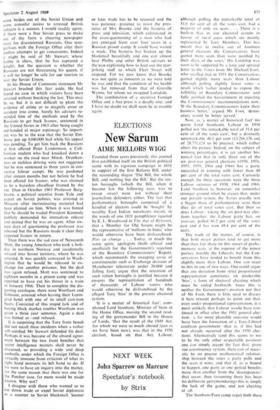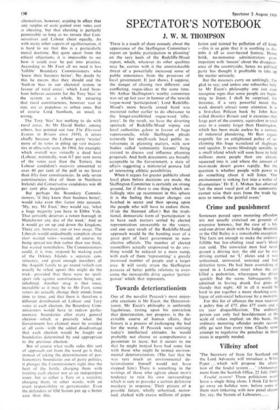ELECTIONS
New Sarum
AIME MELLORS WIGG
Founded three years previously, this journal first established itself on the British political scene with its vigorous campaign in 1831 in support of the first Reform Bill, under the resounding slogan 'The Bill, the whole Bill, and nothing but the Bill.' But the rot- ten boroughs (which the Bill, when it became law the following year, was to sweep away) were not without their journalistic defenders, either. The fact that parliamentary boroughs composed of a handful of electors could be 'bought' by wealthy East Indian merchants meant, in the words of one 1831 pamphleteer (quoted by E. L. Woodward in The Age of Reform), that a Member for Old Sarum might be the representative of 'millions in India' who would otherwise have been disfranchised. Plus ca change . . . Today, in much the same spirit, apologists (both official and unofficial) for the Government's rejection of the Boundary Commissioners' Report, which recommends the sweeping away of constituencies such as Exchange division of Manchester (electorate under 20,000 and falling fast), argue that the retention of such rotten boroughs is justified because it ensures the representation of hundreds of thousands of Labour voters who would otherwise be disfranchised by the alleged Tory 'bias' in the present electoral system.
'It is a matter of historical fact', com- plained Lord Stonham, Minister of State at the Home Office, moving the second read- ing of the gerrymander Bill in the House of Lords, 'that the result of the 1949 Act, for which we were so much abused (just as we have been now), was that in the 1950 election, based on that Act, Labour,
although polling the remarkable total of 51.6 per cent of all the votes cast, had a majority of only six seats . . . There is a built-in bias in our electoral system in favour of rural areas which are mainly represented by Tory Members. This has meant that in twelve out of fourteen general elections the Conservatives have gained more seats than were justified by their share of the votes.' His Lordship was soon to be supported by a long and spirited letter to the Times from Mr Michael toot, who recalled that in 1951 the Conservatives gained slightly more seats than Labour although polling slightly fewer votes—a result which 'rather tended to expose the fallibility of Boundary Commissions' and
fully justified the Government in rejecting the Commissioners' recommendations now.
'If the Boundary Commissioners knew their business better,' argued Mr Foot, 'demo- cracy would be better served.'
Now, as 'a matter of historical fact' (to quote Lord Stonham), Labour in 1950 polled not 'the remarkable total of 51.6 per cent of all the votes cast', but a distinctly unremarkable 46.1 per cent (13,266,176 out of 28.771.124 to be precise), which rather alters the picture. Indeed, on the subject of' winning percentages, it is yet another his- torical fact that in only three out of the six post-war general elections (1950, 1951, 1955, 1959, 1964 and 1966) has a party
succeeded in winning with fewer than 48 per cent of the total votes cast. Curiously enough the three occasions were the three
Labour victories of 1950, 1964 and 1966.
Lord Stonham is, however, on somewhat stronger ground when he argues that, under our present system, the Tories usually win a bigger share of parliamentary seats than they do of total votes cast. But then so does Labour: taking the six post-war elec- tions together, the Labour party has, on average, polled 46.2 per cent of the votes cast and it has won 48.4 per cent of the seats.
',The truth of the matter, of course, is that both major parties tend to get more than their fair share (in this sense) of parlia- mentary seats, at the expense of the minor parties, notably the Liberals; but the Con- servatives have tended to benefit from this slightly more than Labour. One can react to this in one of two ways. One could argue that any deviation from strict proportional representation constitutes an intolerable 'bias', a form of electoral cheating which must be ended forthwith. Since this is neither the Government's position nor that of Mr Foot, there is little need to discuss it here (except perhaps to point out that.
even under proportional representation, it is most unlikely that Labour would have con-
tinued in office after the 1951 general elec-
tion: a far more plausible outcome would have been the formation of a Tory-Liberal coalition government—that is, if this had not already occurred after the 1950 elec- tion). Alternatively (and this seems to me to be the only other respectable position) one can simply accept the fact that, given our constituency system, there can of neces- sity be no precise mathematical relation- ship between the votes a party polls and the seats it wins; and that if, as is bound to happen, one party at one period benefits more than another from the 'discrepancies'
that occur, then (assuming there has been no deliberate gerrymandering) this is simply the luck of the game, and not cheating at all.
The Stonham-Foot camp reject both these
alternatives, however, arguing in effect that any surplus of seats gained over votes cast is cheating, but that cheating is perfectly permissible so long as we ensure that Con- servatives and Labour cheat equally. As with many other aspects of egalitarianism, it is hard to see that this is a particularly moral doctrine. But quite apart from the ethical objections, it is impossible to see how it could ever be put into practice. According to Mr Foot all we need is less 'fallible' Boundary Commissioners who 'knew their business better'. No doubt by this he means that they should end the 'built-in bias in our electoral system in favour of rural areas', which Lord Ston- ham believes accounts for the Tory 'bias' in the system as a whole, by ensuring that rural constituencies, however vast in size, are as populous as urban ones. But of course Lord Stonham, as usual, is wrong.
The Tory 'bias' has nothing to do with rural areas. As Mr David Butler, among others, has pointed out (see The Electoral System in Britain since 1918), it arises chiefly because the Labour party 'wastes' more of its votes in piling up vast majori- ties in ultra-safe seats. In 1964, for example, which overall was virtually a dead heat (Labour, nationally, won 0.7 per cent more of the votes cast than the Tories), the Labour candidate's majority amounted to over 40 per cent of the poll in no fewer than fifty-four constituencies. In only seven constituencies (five of them in Northern Ireland) did Conservative candidates win 40 per cent plus majorities.
But perhaps the Boundary Commis- sioners, 'if they knew their business better', would take even this factor into account. 'My, my, Mr Foot,' they would say, 'what a huge majority you have in Ebbw Vale. That certainly deserves a rotten borough in Manchester any day of the week.' And so it would go on up and down the kingdom. There are, however, one or two snags. The Liberals would undoubtedly complain about their wasted votes—wasted, of course, by being spread too thin rather than too thick, but wasted nonetheless. The Commissioners could, it is true, respond by making each of the Orkney Islands a separate con- stituency, and given enough members of the Asquith family to go round (which can usually be relied upon) this might do the trick— provided that there were no spoil- sport rule against constituencies being un- inhabited. Another snag is that since, incredible as it may be to Mr Foot, some voters do actually change their minds from time to time, and that there is therefore a different distribution of Labour and Tory votes at each election, the Boundary Com- missioners would have to redraw parlia- mentary boundaries after every general election—which is precisely what the Government has claimed must be avoided at all costs—with the added disadvantage that each election would be fought on boundaries determined by and appropriate to the previous election.
But of course what really rules this sort of approach out from the word go is that, instead of taking the determination of par- liamentary boundaries out of party politics, it plunges the Commissioners right into the heat of the battle, charging them with treating each elector not as an independent voter, but as either a Tory or a socialist; charging them, in other words, with an overt responsibility to gerrymander. Even the defenders of Old Sarum put up a better case than this.



































 Previous page
Previous page